When I said that I was a huge risk-taker, that was my ham-fisted way of saying I really didn’t expect to be living at the age of 30.
Photography by Tamar Levine
Styling by Alvin Stillwell @ Celestine Agency
Grooming by Kerrie Urban @ The Wall Group
Photographer’s Assistant: Amanda Yanez
Grab your inhalers, Losers, it’s time to go play in the storm drain once more. Andy Muschietti’s It Chapter Two, the closing adaptation of Stephen King’s spooky source novel, hits theaters Friday.
Released two years ago, Muschietti’s It went on to become the highest-grossing horror movie of all time, scaring up a record-shattering $700 million at the global box office—a hefty return on its $35 million budget, it’s seldom seen—which all but guaranteed a fast-tracked sequel. It Chapter Two picks up 27 years after the events of that first movie, in which a gang of bullied misfits calling themselves the Losers’ Club made a pact to return to their hometown of Derry, Maine should the nightmare-fuel clown named Pennywise (Bill Skarsgård) ever rise again. In the wake of another tragedy, the kids are back, now all grown up and portrayed by the coolest ensemble cast any of us could’ve ever hoped for: James McAvoy as Bill Denbrough, Jessica Chastain as Beverly Marsh, Bill Hader as Richie Tozier, Jay Ryan as Ben Hanscom, James Ransone as Eddie Kaspbrak, Andy Bean as Stanley Uris, and Isaiah Mustafa as Mike Hanlon. Meanwhile, the original Losers—Wyatt Oleff, Jaeden Lieberher, Sophia Lillis, Finn Wolfhard, Jeremy Ray Taylor, Chosen Jacobs, and Jack Dylan Grazer—reprise their roles for flashbacks to 1989 in a hopscotching narrative structure.
To take us behind-the-scenes of It Chapter Two is Ransone, who plays grown-up hypochondriac Eddie originally portrayed by Grazer in the first installment. The last time Anthem sat down with the Baltimore native, it was in Manhattan’s East Village to discuss Ti West’s In a Valley of Violence. Ransone is best known for his supporting turns in Sean Baker’s Tangerine, the Sinister franchise and the HBO miniseries Generation Kill, not to mention his indelible performance as Ziggy Sobotka on HBO’s cult phenom The Wire. More recently, he appeared in Rupert Wyatt’s Captive State alongside John Goodman and Hulu’s space drama The First opposite Sean Penn.
Anthem paid Ransone and his canines a visit at his home in Los Angeles for a photoshoot.
It Chapter Two opens in theaters everywhere on September 6.
I can imagine your press duties are pretty relentless at the moment.
It’s been a little weird. It’s the first time I’ve had to do this much. Andy and Barbara [Muschietti] are doing more, which is nuts. They flew all over South America and then they went to London.
Was the Los Angeles premiere your first time seeing the finished film?
I did not watch the movie, my friend. I watched up until the Jade of the Orient [scene]. It’s really hard for me to do it because I don’t like to watch myself.
Something you said stuck with me the last time we spoke. You said, “Film and watching movies, and even television, is supposed to be an experience that alters your consciousness. It’s supposed to alter your state of consciousness, like taking LSD or mushrooms.” I mean, that’s the hope right? Do you find that it’s actually quite rare that it happens?
Yes. I think in the last number of years I’ve had that experience less and less. Some of that might just be age though, too. I just might be at a certain age where it doesn’t have the same effect on me as it did when I was a kid, which makes sense. It doesn’t have to do with the movies or me, it’s just a natural progression that happens with people. And when I said altered state of consciousness, I meant—ugh, this is getting to be a heady conversation. I don’t want to come off like a dick or pretentious. Everybody’s reality is unique to the experiencer, so the best thing that can happen to you is when you have something that alters your perception or at least makes you a little more aware. If you’re experiencing something actively, or passively, and then you reflect on that experience and it brings up something inside of you that needs to be addressed or changed or shifted around towards the positive, then that altered state of consciousness or at least the means in which it was altered was worth having, right? That’s actually why I think horror movies are very popular right now. They’re somehow, for the most part, depoliticized. You could argue some stuff with Jordan Peele, that there are all these political undertones to it, but underneath that I believe there are metaphysical, universal ideas.
I watched a Variety interview where the reporter was telling Andy just how difficult it was for him and his husband to watch the opening scene of It Chapter Two. It explores the darkness of humanity that we see day in, day out, going beyond the supernatural horror that is Pennywise. It’s no secret that Stephen King was writing his book when Charlie Howard was murdered—a hate crime that occurred in his hometown. It’s like what was scary then is scary now, and maybe forever.
This is something [Bill] Hader and I’ve talked about a lot in interviews. I think things are kind of always the same, which is weird. They were dealing with that in the ‘80s, dealing with that in the ‘90s, and they’re dealing with it now. First of all, this is probably an unpopular opinion because most people are experiencing what they think is going on in the world vis-à-vis their phones like, “Look at all these horrible things that are happening!” But on the whole, things are better. There’s less global poverty than there ever has been. The rate of infectious disease in African countries has gone down like 90% in the last hundred years. Now we see disease in Western Europeans based on lifestyle choices, right? Total choice! They weren’t forced to work in a mine. Dietary and lifestyle choices led to disease in Western Europeans. Things are scary, but they’ve always been kind of scary. I had a kid this year. It’s hard to watch anything that’s violent anymore. It just makes me really uncomfortable. It’s not the nature of the thing or the subject matter. All violence is hard for me to watch in movies now. I can’t do it. Across the board, it’s not something I enjoy seeing. I don’t like watching gunfights or revenge movies. I don’t think it’s interesting. I’m trying to imagine a more peaceful world that I’m bringing my son into. In the same way that like, here’s this really horrifying thing that Stephen King is writing about in the ‘80s, you know, Keanu Reeves can wack 75 people in John Wick and everybody claps about it.
I often find myself defending my love of horror. I do feel like the genre is often deemed less than in terms of quality or worth, even though there’s a huge appetite for it.
Defending yourself to who though? Are these other film critics?
The film culture at large. It’s so often viewed as the throwaway genre. They even coined that term “elevated horror” to separate something like Hereditary from a “stinker” like, I don’t know, whatever you think is inferior by comparison.
Here’s what I think it is: I think you have people coming of age. I think you have the intelligency of writing about film or commenting about film or deconstructing films that came of age with the advent of cable TV. What they saw in like The Sopranos or The Wire was what was representative of higher-brow stories. In that period of time, the Saw franchise was popular. That’s not horror—it’s torture pornography. So they’re used to thinking of it in this way. To those people I’ll say, “Tell that to William Friedkin or Stanley Kubrick.” The Exorcist and The Shining were made within a couple of years of one another. No one’s gonna go, “Those are horror movies.” They’ll say, “Those are masterpieces of cinema.” But technically, they would still fall under the banner of being a horror movie, you know? I try to go by directors. I love Sam Raimi. I love John Carpenter. It’s so lame that people poo poo his ‘80s works and throw them into schlocky stuff. Man, They Live has some of the best social commentary about consumerism of the ‘80s. And it stars a pro wrestler! That’s just awesome. Those people who are taking that position are elitist snobs, that’s how I feel. Picnic at Hanging Rock!
Versus The Human Centipede.
Right. That’s like the imagination of a 12-year-old. It’s like, “What’s the grossest thing I can think of? Let’s make that into a movie!” What I would say to all the people that you find yourself defending about horror against is, “We go through cycles of it.” Films go through cycles, obviously. What’s popular? What’s working? Horror movies will always make money. There will always be a market for them. So what happens is, you have younger filmmakers, younger voices, who wanna tell certain stories who aren’t given the chance unless a producer puts up the money, knowing it’s gonna be profitable. Because why would a producer want to give money to make something if they won’t have a return on their investment? Jordan Peele is the perfect example of this. He made Get Out for not a lot of money with Blumhouse. He was also working with really big, heady ideas that he used under the banner of horror, which is gonna be profitable no matter what. Horror right now is, if you pay really close attention to it, almost the same sort of training ground as music videos were in the ‘90s, from Spike Jonze to David Fincher. They got to flex their muscles and try out their skills, whether that involved camera techniques, storytelling, editing or special effects. Music videos allowed them to test out their ideas as filmmakers and I think horror has since replaced that.
Speaking of profitability, Andy’s first It is the highest grossing horror movie of all time.
No pressure. [laughs]
I have this quote from you: “The scary stuff was that these characters are in their 40s and none of them had children. They once had unlimited potential, but this huge event sidelines them.” I wonder if that’s where you start in processing and building a character like Eddie.
That’s exactly where I started processing it. What’s scarier about the second half of that book is that, at 40, you don’t have as much potential anymore because your future has run out. Half the sand is through the hourglass and you can’t get that back. When you’re a little kid, you only imagine the highest level of potential that you could have. You’re not tracking the bad stuff—the icebergs you hit on the boat as you chart the course through your life. That’s what was scary about the book. They all came back together and none of them had children, and the scars that they have are permanent now. They have less of their life in front of them. That’s what was scary for me. I see that in the red carpet photos, on my face. I do! I’m like, “Woah, I’m older than I thought I looked in my head.”
I’ve come to learn that It Chapter Two increased the Stephen King quotient from the previous installment. The creators wanted him to participate more directly, asking him what scenes he thought were important to include in the movie from the book. I think it’s usually the other way around where you go into sequels or expand into a franchise and the source visionary gets squeezed out along the way.
I think that’s all dependent on the two unique people coming together at any given moment in time, where they are, and their relationship to one another. The inverse of that is absolutely true with Stephen King and Stanley Kubrick. When I met Stephen King, that’s all I wanted to talk to him about—“What was that like?” Because they hated one another. It was basically Kubrick’s fuck you to Stephen King with the red Volkswagen Beetle overturned in the car crash [in The Shining]. That was Kubrick’s subtle way of saying to King, “I’m gonna make the fucking movie that I want.” That also says, at that time in the ‘70s, King was probably much more precious about his ideas and thinking it’s such an insult that Kubrick would do this. Now that he’s older, it’s probably less important to him. And I’m like, “Andy and Stephen King got along so well!” [laughs] That’s at least what I think. It was two artists that were giving one another mutual respect. That’s cool. It’s cool to personalize it in that manner.
Barbara said this about you and Jack [Dylan Grazer]: “With the speed at which they talk and think, and their physical resemblance to each other, they must just be the same person. We joked that, when they meet, they will both probably combust.” Did you feel like you got a head start with Eddie because you had Jack’s foundation to work from?
A hundred percent. It felt like a weird, divine hand of god. You know when they call Powerball numbers? It’s like, “No fucking way. There’s no way it’s that much!” That’s how I felt. Here’s this kid that looks like me, that plays to my strengths, that played against type in the book. I just thought, “Man, this is weird.” Honestly, I just felt lucky. That was it. I didn’t feel like, “I got a handle on this. Here’s how I’m going to tackle the character.” I just felt sheer luck from it.
I would guess that you’re good at keeping things under wraps when it comes to spoilers.
I’ve learned my lesson on what not to say. I don’t want to get killed. I want to work in the future.
I always find it funny when those questions get asked by reporters. PR from the studio is in that room with you monitoring, literally looking right at you. You never hear about the repercussions though. I’ve been told that you can get sued over that.
You mean I can? I can get sued?
I’ve been told that by actors on higher-profile projects such as this one.
That might be true, but that might also be an old wives’ tale like, “You’re gonna go blind if you keep masturbating!” I think you need to really fuck up, you know what I mean? The way that I feel about this is, I just want to respect my employers’ wishes. But I’m also fucking shocked because there’s a miniseries that’s based on a book. Eddie doesn’t get on his spaceship at the end and go back to his home planet. So that’s what I’m always surprised about. The source material is already out there and many people know this story. At the same time, it has to do with self-preservation. Some of it becomes like, “Can this idiot who tap dances in front of the camera keep a secret long enough? If he can, maybe he’ll be cool enough for us to hire on the next one.” I’m just surprised that people care that much. That’s what freaks me out.
I hate to bore you with a casting question, but—
No, no, no. Go ahead.
It feels unconventional how this ensemble came together. Jessica [Chastain] has gone on the record to say that she nominated James McAvoy while they were working together on another movie. I can connect the dots between Jessica and Xavier Dolan’s involvement, just remembering how infatuated she was with Mommy the year that played at Cannes. Then Finn [Wolfhard] talked about wanting Bill Hader to play his older self in some interview and it appears they sort of ran with that idea. Correct me if I’m wrong, but this is not how the casting of movies, especially high-profile studio movies, normally come together. Did you get involved in a similarly atypical way?
First of all, I’m making some assumptions that I think are pretty accurate about Andy’s process. He does the same thing that a lot of directors do, which is that he’ll work with the same actors over and over and over and over again. He’ll also take a lot of input from actors about what other actors they think are good. Andy Bean was friends with Bill Skarsgård, and I think Andy Bean and Andy Muschietti met one another at a party. Andy Bean is a really good actor. He doesn’t have the flashiest part in the movie, but he’s really good. That’s not lip service. I also met Andy [Muschietti] at a party. I met Andy and Barbara at a party in 2016 through a studio executive friend of mine, Dani Bernfeld, who introduced me to them. I auditioned for the first one, but I don’t think Andy reverse engineered it. I think it’s some dumb, stupid luck that he got Jack Dylan Grazer for the part of Eddie. So it’s not necessarily traditional casting, I guess, but he probably knew who he wanted or was at least pretty close to maybe having two choices all the way through. Then he kind of made that work in spite of the studio’s normal process.
Let’s go back. You auditioned for the first one?
What happened is, they were about to go make It and Andy had me come in to audition for a role in the first movie. I’m not gonna say which one—I can’t. Then he went off and shot the movie and we were still really friendly with each other. When the movie came out, my brother saw Jack in It and he was like, “There’s this kid in the movie who looks so much like you, it’s weird.”
You do look alike, a lot alike.
I thought, “That’s really interesting.” I was filming that TV show, The First, in New Orleans around that time. I got this weird feeling that I was gonna get this movie, I don’t know why, and I did. I still had to audition to prove it to the studio, but it was really strange the way it all came together. It was suddenly like a two-and-a-half, three-year process.
To touch on what you were saying earlier about Andy and directors who repeat collaborations, I think it says a lot about the actors too in that equation—about their talent, work ethic, and likability. In your case, you’ve worked with Sean Baker, Spike Lee, and David Simon more than once.
It’s a weird business, man. It’s like the circus. You come together for a summer. Like any other thing that’s in the nature of creativity, you ask, “Did I get along with that person? Did it work well? Would I do it again?” And that’s not to say that some people do or don’t like it’s my commentary on others. I’m naturally terrified that I’m never gonna work again, but I’m not manipulating people into hiring me. With Sean, it’s maybe because we got along. I just got lucky with David. But David uses a lot of the same people over and over again anyways like Chris Bauer, who played my dad on The Wire, for example. He’s a dear friend of mine still to this day. We’re really close. He went on to shoot three seasons of The Deuce with James Franco. So I think a lot of that has to do more with how the creators work. Once you’re kind of on the inside, unless you really fuck up, they tend to work with the same people over and over. Again, it’s like the circus. Did you ever hear Malcolm McDowell talk about Stanley Kubrick?
No, tell me.
He thought they were going to be friends forever, and they weren’t, so he started talking all this shit about Kubrick openly in the press. Malcolm McDowell thought they were gonna be friends because they were so in the trenches together, right? That’s just kind of the nature of the business. It’s close relationships, separate, close relationships, separate.
It’s no secret to anyone who follows you on Instagram or to anyone who has seen one of your group interviews that you and Hader have a special bond. Did you know him from before?
We met at an audition for Public Enemies, that Michael Mann movie, like 10 years ago. I think Bill and I share really similar sensibilities about what we think is funny, what music we like. On top of that, I think we had very similar backgrounds growing up, too. It’s very much the same with Isaiah Mustafa, too. I think that really helped. My sense of humor falls very much into South Park. I just think that shit’s so funny—anything super irreverent that’s going to make everybody else super pissed off. And the more absurd it gets, the better. It just makes me so happy. So we didn’t have that much work to do. The other thing is that, when I saw Hader in Toronto, we sat down and we immediately started talking about the darkest parts of our personalities. Usually, the funniest people have the most fucked up backgrounds.
I was watching one of your BUILD interviews and perked up when you mentioned working with Agnieszka Holland on The First. I had the great pleasure of sitting down with her when she was the guest of honor at the Seoul International Women’s Film Festival 2 years ago. I learned that she was born a few years after the Second World War ended. Her father was a Holocaust survivor and her mother was an underground fighter during the Warsaw Uprising. So I asked her just how much life experience informs her filmmaking. I’d like to ask you the same thing. The Internet tells me that you were a “huge risk-taker” in your 20s. In that conversation with BUILD, you also talked about this road trip you took across America to see real people and their circumstances—not what’s portrayed in the media or on TV, which I believe you no longer even own.
There are TVs in my house—I just don’t watch it anymore. My wife still likes to watch TV. She’ll sneak-watch the Kardashians when I’m not here.
This is a weird thing to quantify, but how much has life informed your work as an actor? It must in immeasurable ways, in the way you understand characters, the way you work with others on set, and the way in which you choose projects.
First of all, when I said that I was a huge risk-taker, that was my ham-fisted way of saying I really didn’t expect to be living at the age of 30. I thought that even as a child. Now that I’m older and had a son this year, I’m looking back on my life with a new set of eyes. I think I come from much rougher circumstances than I had told myself for a long time. Again, I didn’t expect to live past 30–I remember really feeling that way. So when I did, it was kind of like, “Huh. That’s weird.” [laughs] “What now?” I think on some level it was selfish of me to look at it that way because then I wouldn’t have to take any responsibility for my adult choices. As for getting in my car and driving across country by myself, it was because I started to get this overwhelming feeling that everything that was being portrayed in the media was trying to cement fear and tension in me. I just had to go see it with my own eyes. I had to do it personally. What I found was that most people that I encountered were poor and really scared. It didn’t matter what their race or ethic background or sexuality was—they were poor and scared. That was the thing that made me feel like, “I don’t wanna watch TV. I don’t want to participate in that anymore.” And how it informs my job as an actor now has less to do with what I’m trying to portray on screen and more to do with how I treat people around me who are on set like the PAs or those low-rung publicists. It sounds so dumb, but change actually does start with you. People get so worried about these big world events that they don’t even realize they’re being an asshole to the guy at 7-Eleven. If you literally want to change the world, just be present enough to be like, “I’m gonna let this guy cut me off in traffic because maybe he’s having a harder day.” People will go, “That’s not going to change anything.” If everybody acted that way, it would. I wish I had a sexier answer about how it informed my art.
You’re always real. I think that’s what would actually make you combust: inauthenticity.
I wish I knew how to be another way, dude, I really do. I think my life would be much easier.
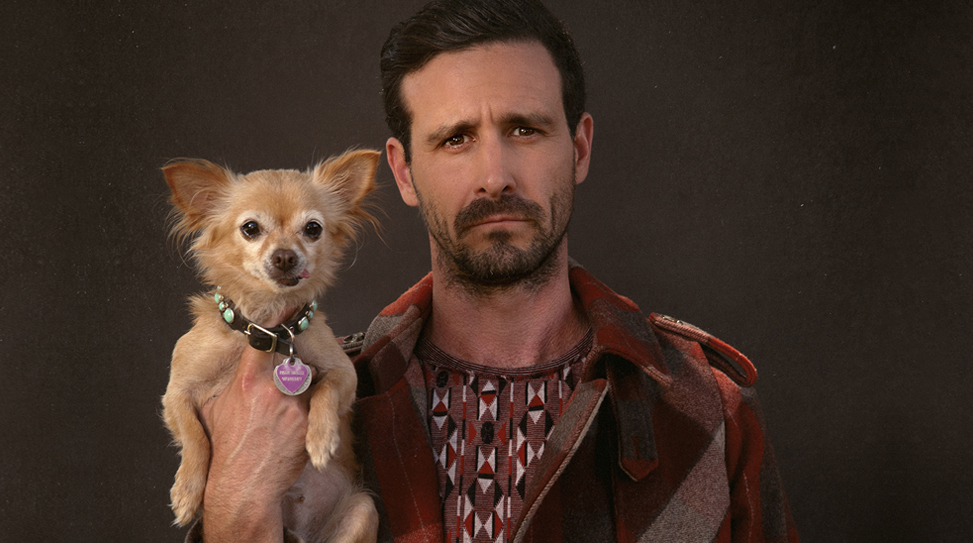

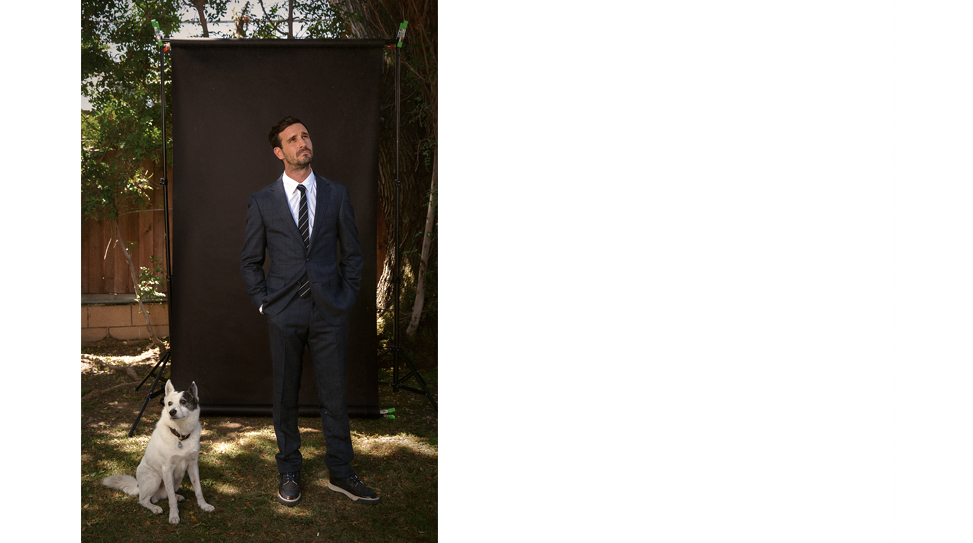
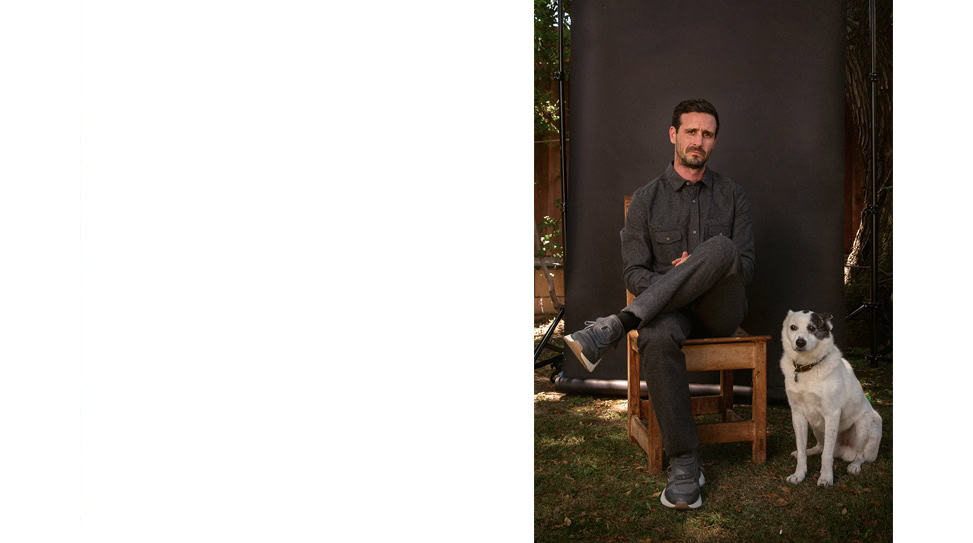
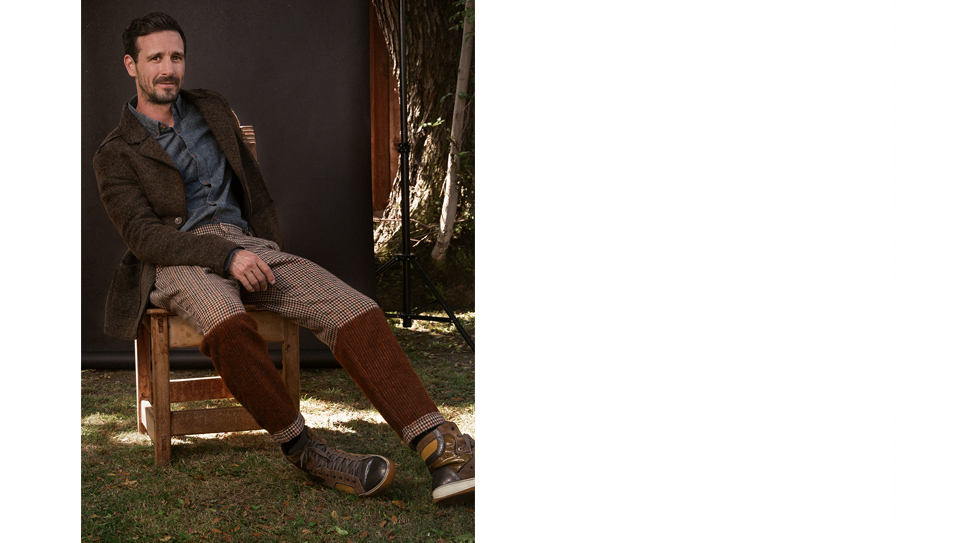
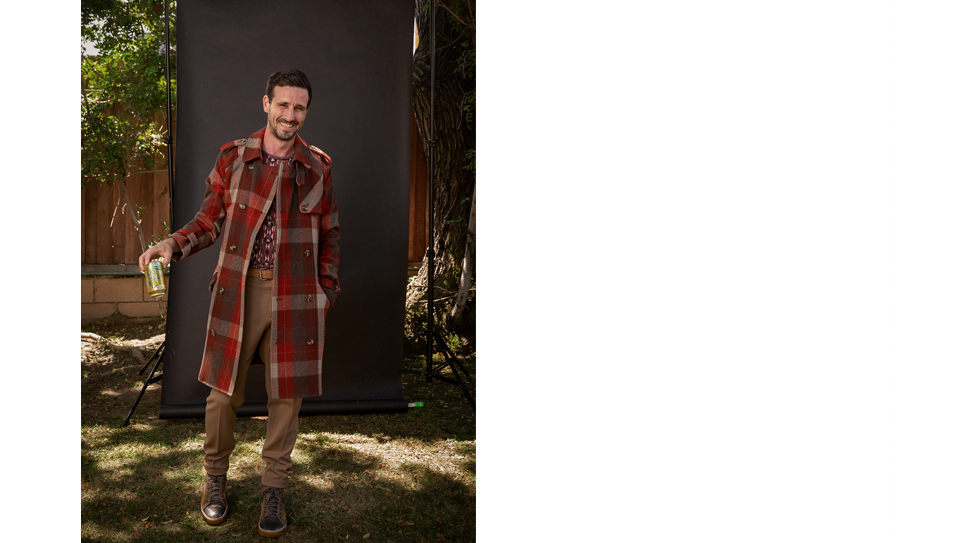
 A Conversation with Sean Wang
A Conversation with Sean Wang A Conversation with James Paxton
A Conversation with James Paxton
No Comments